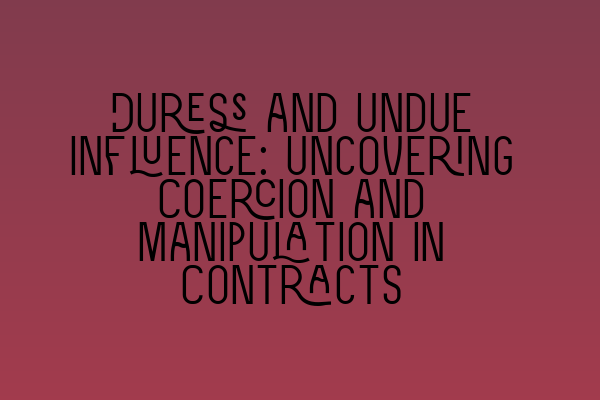Duress and Undue Influence: Uncovering Coercion and Manipulation in Contracts
Contracts are the building blocks of business transactions, serving as legally binding agreements that outline the rights and obligations of parties involved. However, it is crucial to ensure that contracts are entered into freely and without any form of coercion or manipulation. This is where the concepts of duress and undue influence come into play.
Duress and undue influence are two legal doctrines that protect individuals from being forced or manipulated into entering into contracts against their will or best interests. Understanding these concepts is essential for both solicitors and individuals entering into contracts, as being aware of their presence can help identify and challenge unfair or unjust agreements.
Duress: Uncovering Coercion
Duress refers to the use of threats or actual violence to force someone to enter into a contract against their will. It is a form of coercion that undermines the voluntary nature of contract formation. When duress is present, the injured party can seek to have the contract declared void or voidable.
There are two types of duress: physical duress and economic duress. Physical duress involves the use of physical force or violence to compel someone to enter into a contract. On the other hand, economic duress occurs when one party exerts extreme pressure on another by threatening to withhold or take away something of value, such as a job or essential resources.
In order to prove duress, the injured party must demonstrate three key elements:
- The existence of a threat or use of force or undue pressure.
- The threat or pressure was illegitimate and unlawful.
- The contract was entered into due to the threat or pressure.
Duress can be a difficult concept to prove in court, as it often involves subjective elements and requires strong evidence. However, seeking legal advice from a solicitor experienced in contract law can help individuals navigate through the intricacies of duress claims.
Undue Influence: Unmasking Manipulation
Undue influence occurs when one party takes advantage of a position of power or trust to exploit and manipulate the vulnerable party into entering into a contract. Unlike duress, undue influence does not involve threats or physical force but relies on the relationship between the parties.
There are two types of undue influence: actual undue influence and presumed undue influence. Actual undue influence occurs when there is evidence of explicit manipulation, coercion, or abuse of authority. Presumed undue influence, on the other hand, arises in certain types of relationships where there is an inherent power imbalance, such as between a solicitor and a client or a doctor and a patient.
In order to establish undue influence, the injured party must prove that:
- There was a relationship of trust and confidence between the parties.
- The party in the dominant position exerted influence over the vulnerable party.
- The contract was a result of this undue influence.
Undue influence cases require a careful examination of the facts and circumstances surrounding the contract. It is important to consult with a knowledgeable contract law solicitor to gather the necessary evidence and arguments to challenge the validity of a contract based on undue influence.
Seeking Legal Advice
When entering into contracts, it is crucial to ensure that they are based on genuine consent and free from any form of coercion or manipulation. If you suspect that a contract you are involved in may be tainted by duress or undue influence, seeking legal advice is paramount.
At SQE Contract Law, we specialize in contract law and provide expert advice and representation for individuals facing contract disputes involving duress or undue influence. Our team of experienced solicitors will review your case, gather evidence, and formulate strong legal arguments to protect your rights and interests.
If you want to test your knowledge of contract law, take a look at our SQE 1 Practice Exam Questions and explore our SQE 1 Practice Mocks FLK1 FLK2. We also offer comprehensive preparation courses for both SQE 1 and SQE 2 exams. Stay updated with the latest SRA SQE Exam Dates on our website.
Remember, your rights matter, and understanding the complexities of duress and undue influence can protect you from unfair contracts. Contact SQE Contract Law today to schedule a consultation and safeguard your interests.
